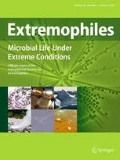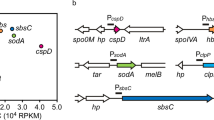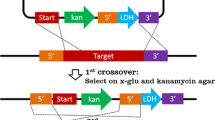Abstract
Geobacillus spp. are moderate thermophiles that have great potential for use in diverse applications. For effective utilization of the species, genetic tools have been extensively studied; however, an overexpression vector remains to be developed. Here we constructed a plasmid vector that can shuttle between Escherichia coli and Geobacillus spp., and which contained a maltose-inducible promoter from Geobacillus kaustophilus HTA426. Although the vector (termed pGKE119) was originally designed for basal gene expression, it surprisingly directed robust protein production in G. kaustophilus. Protein production essentially occurred in an auto-inducible manner without maltose; however, some proteins were produced more efficiently in the presence of maltose. Although the productivity was affected by culture conditions, three proteins were successfully produced with abundance ratios of 12–27% (on a total protein basis) and yields of 77–170 mg (per L culture). pGKE119 directed substantial protein production even in Geobacillus subterraneus, Geobacillus thermoglucosidasius, and Geobacillus thermoleovorans. This suggests that pGKE119 can use a range of Geobacillus spp. as hosts and widely expand their genetic toolbox. Because Geobacillus spp. are highly proliferative bacteria that are distinct from organisms used as protein production hosts, pGKE119 may also provide a novel platform for hyperproduction of recombinant proteins.






Similar content being viewed by others
Abbreviations
- OD600 :
-
Optical density at 600 nm
- LB:
-
Luria–Bertani
- SDS-PAGE:
-
Sodium dodecyl sulfate–polyacrylamide gel electrophoresis
- []:
-
A carrier state of the plasmid
References
Amartey SA, Leak DJ, Hartley BS (1991) Development and optimization of a defined medium for aerobic growth of Bacillus stearothermophilus LLD-15. Biotechnol Lett 13:621–626. https://doi.org/10.1007/BF01086315
Bacon LF, Hamley-Bennett C, Danson MJ, Leak DJ (2017) Development of an efficient technique for gene deletion and allelic exchange in Geobacillus spp. Microb Cell Fact 16:58. https://doi.org/10.1186/s12934-017-0670-4
Baghban R, Farajnia S, Rajabibazl M, Ghasemi Y, Mafi A, Hoseinpoor R, Rahbarnia L, Aria M (2019) Yeast expression systems: overview and recent advances. Mol Biotechnol 61:365–384. https://doi.org/10.1007/s12033-019-00164-8
Bartosiak-Jentys J, Hussein AH, Lewis CJ, Leak DJ (2013) Modular system for assessment of glycosyl hydrolase secretion in Geobacillus thermoglucosidasius. Microbiology 159:1267–1275. https://doi.org/10.1099/mic.0.066332-0
Bennett PM, Grinsted MJ, Richmond MH (1977) Transposition of TnA does not generate deletions. Mol Gen Genet 154:205–211. https://doi.org/10.1007/BF00330839
Blanchard K, Robic S, Matsumura I (2014) Transformable facultative thermophile Geobacillus stearothermophilus NUB3621 as a host strain for metabolic engineering. Appl Microbiol Biotechnol 98:6715–6723. https://doi.org/10.1007/s00253-014-5746-z
Daas MJA, van de Weijer AHP, de Vos WM, van der Oost J, van Kranenburg R (2016) Isolation of a genetically accessible thermophilic xylan degrading bacterium from compost. Biotechnol Biofuels 9:210. https://doi.org/10.1186/s13068-016-0618-7
Figurski DH, Helinski DR (1979) Replication of an origin-containing derivative of plasmid RK2 dependent on a plasmid function provided in trans. Proc Natl Acad Sci USA 76:1648–1652. https://doi.org/10.1073/pnas.76.4.1648
Frenzel E, Legebeke J, van Stralen A, van Kranenburg R, Kuipers OP (2018) In vivo selection of sfGFP variants with improved and reliable functionality in industrially important thermophilic bacteria. Biotechnol Biofuels 11:8. https://doi.org/10.1186/s13068-017-1008-5
Hussein AH, Lisowska BK, Leak DJ (2015) The genus Geobacillus and their biotechnological potential. In: Sariaslani S, Gadd GM (eds) Advances in applied microbiology, vol 92. Elsevier, Amsterdam, pp 1–48
Inoue H, Nojima H, Okayama H (1990) High efficiency transformation of Escherichia coli with plasmids. Gene 96:23–28. https://doi.org/10.1016/0378-1119(90)90336-P
Kananavičiūtė R, Čitavičius D (2015) Genetic engineering of Geobacillus spp. J Microbiol Methods 111:31–39. https://doi.org/10.1016/j.mimet.2015.02.002
Kaur J, Kumar A, Kaur J (2018) Strategies for optimization of heterologous protein expression in E. coli: roadblocks and reinforcements. Int J Biol Macromol 106:803–822. https://doi.org/10.1016/j.ijbiomac.2017.08.080
Khan SA (1997) Rolling-circle replication of bacterial plasmids. Microbiol Mol Biol Rev 61:442–455
Kobayashi J, Furukawa M, Ohshiro T, Suzuki H (2015a) Thermoadaptation-directed evolution of chloramphenicol acetyltransferase in an error-prone thermophile using improved procedures. Appl Microbiol Biotechnol 99:5563–5572. https://doi.org/10.1007/s00253-015-6522-4
Kobayashi J, Tanabiki M, Doi S, Kondo A, Ohshiro T, Suzuki H (2015b) Unique plasmids generated via pUC replicon mutagenesis in an error-prone thermophile derived from Geobacillus kaustophilus HTA426. Appl Environ Microbiol 81:7625–7632. https://doi.org/10.1128/aem.01574-15
Nagai T, Ibata K, Park ES, Kubota M, Mikoshiba K, Miyawaki A (2002) A variant of yellow fluorescent protein with fast and efficient maturation for cell-biological applications. Nat Biotechnol 20:87–90. https://doi.org/10.1038/nbt0102-87
Nakamura Y, Gojobori T, Ikemura T (2000) Codon usage tabulated from international DNA sequence databases: status for the year 2000. Nucleic Acids Res 28:292–292. https://doi.org/10.1093/nar/28.1.292
Pogrebnyakov I, Jendresen CB, Nielsen AT (2017) Genetic toolbox for controlled expression of functional proteins in Geobacillus spp. PLoS ONE 12:e0171313. https://doi.org/10.1371/journal.pone.0171313
Reeve B, Martinez-Klimova E, de Jonghe J, Leak DJ, Ellis T (2016) The Geobacillus plasmid set: a modular toolkit for thermophile engineering. ACS Synth Biol 5:1342–1347. https://doi.org/10.1021/acssynbio.5b00298
Sheng LL, Kovacs K, Winzer K, Zhang Y, Minton NP (2017) Development and implementation of rapid metabolic engineering tools for chemical and fuel production in Geobacillus thermoglucosidasius NCIMB 11955. Biotechnol Biofuels 10:5. https://doi.org/10.1186/s13068-016-0692-x
Suzuki H (2017) Geobacillus kaustophilus HTA426: a model organism for moderate thermophiles. In: Berhardt LV (ed) Advances in medicine and biology, vol 114. Nova Science Publishers, New York, pp 75–108
Suzuki H (2018) Peculiarities and biotechnological potential of environmental adaptation by Geobacillus species. Appl Microbiol Biotechnol 102:10425–10437. https://doi.org/10.1007/s00253-018-9422-6
Suzuki H, Yoshida K (2012) Genetic transformation of Geobacillus kaustophilus HTA426 by conjugative transfer of host-mimicking plasmids. J Microbiol Biotechnol 22:1279–1287. https://doi.org/10.4014/jmb.1203.03023
Suzuki H, Takahashi S, Osada H, Yoshida K (2011) Improvement of transformation efficiency by strategic circumvention of restriction barriers in Streptomyces griseus. J Microbiol Biotechnol 21:675–678. https://doi.org/10.4014/jmb.1102.02038
Suzuki H, Murakami A, Yoshida K (2012) Counterselection system for Geobacillus kaustophilus HTA426 through disruption of pyrF and pyrR. Appl Environ Microbiol 78:7376–7383. https://doi.org/10.1128/aem.01669-12
Suzuki H, Wada K, Furukawa M, Doi K, Ohshima T (2013a) A ternary conjugation system for the construction of DNA libraries for Geobacillus kaustophilus HTA426. Biosci Biotechnol Biochem 77:2316–2318. https://doi.org/10.1271/bbb.1304921
Suzuki H, Yoshida K, Ohshima T (2013b) Polysaccharide-degrading thermophiles generated by heterologous gene expression in Geobacillus kaustophilus HTA426. Appl Environ Microbiol 79:5151–5158. https://doi.org/10.1128/aem.01506-13
Takami H, Inoue A, Fuji F, Horikoshi K (1997) Microbial flora in the deepest sea mud of the Mariana Trench. FEMS Microbiol Lett 152:279–285. https://doi.org/10.1016/s0378-1097(97)00211-5
Takami H, Takaki Y, Chee GJ, Nishi S, Shimamura S, Suzuki H, Matsui S, Uchiyama I (2004) Thermoadaptation trait revealed by the genome sequence of thermophilic Geobacillus kaustophilus. Nucleic Acids Res 32:6292–6303. https://doi.org/10.1093/nar/gkh970
Taylor MP, Esteban CD, Leak DJ (2008) Development of a versatile shuttle vector for gene expression in Geobacillus spp. Plasmid 60:45–52. https://doi.org/10.1016/j.plasmid.2008.04.001
Tominaga Y, Ohshiro T, Suzuki H (2016) Conjugative plasmid transfer from Escherichia coli is a versatile approach for genetic transformation of thermophilic Bacillus and Geobacillus species. Extremophiles 20:375–381. https://doi.org/10.1007/s00792-016-0819-9
Wiegel J, Ljungdahl LG (1986) The importance of thermophilic bacteria in biotechnology. CRC Rev Biotechnol 3:39–108
Acknowledgements
This work was funded by the following organizations: Japan Society for the Promotion of Science (Grant numbers: 25450105 and 17K06925), Nagase Science and Technology Foundation, and the Institute for Fermentation, Osaka, Japan.
Author information
Authors and Affiliations
Corresponding author
Ethics declarations
Conflict of interest
The authors declare that they have no conflicts of interest. This article does not contain any studies with human participants or animals performed by any of the authors.
Additional information
Communicated by Cann.
Publisher's Note
Springer Nature remains neutral with regard to jurisdictional claims in published maps and institutional affiliations.
Rights and permissions
About this article
Cite this article
Kurashiki, R., Mizuno, T., Murata, K. et al. A plasmid vector that directs hyperproduction of recombinant proteins in the thermophiles Geobacillus species. Extremophiles 24, 147–156 (2020). https://doi.org/10.1007/s00792-019-01142-3
Received:
Accepted:
Published:
Issue Date:
DOI: https://doi.org/10.1007/s00792-019-01142-3




